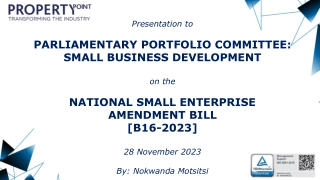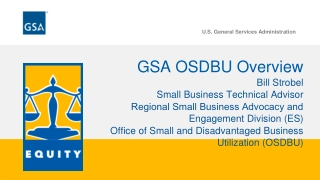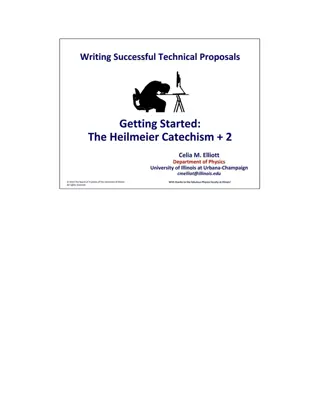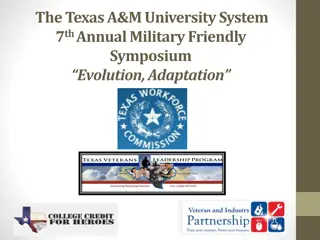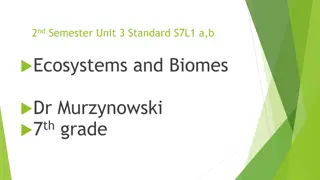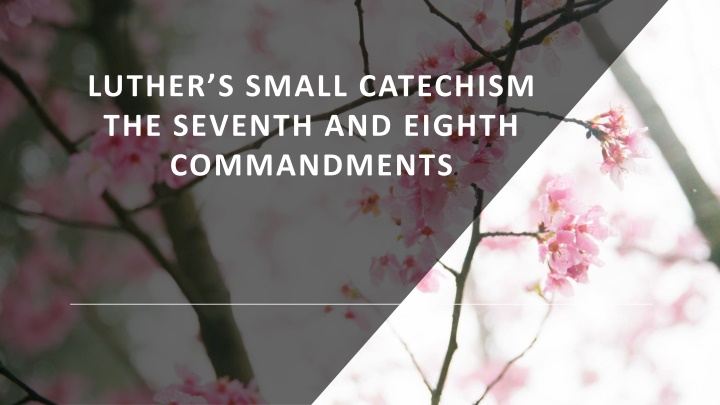
Seventh Commandment in Luther's Small Catechism
Explore the significance of the Seventh Commandment, "You shall not steal," in Luther's Small Catechism. Learn how it emphasizes generosity, protecting earthly gifts, and fostering a sense of vocation. Discover the importance of respecting and improving our neighbor's possessions while honoring God's generosity.
Download Presentation

Please find below an Image/Link to download the presentation.
The content on the website is provided AS IS for your information and personal use only. It may not be sold, licensed, or shared on other websites without obtaining consent from the author. If you encounter any issues during the download, it is possible that the publisher has removed the file from their server.
You are allowed to download the files provided on this website for personal or commercial use, subject to the condition that they are used lawfully. All files are the property of their respective owners.
The content on the website is provided AS IS for your information and personal use only. It may not be sold, licensed, or shared on other websites without obtaining consent from the author.
E N D
Presentation Transcript
LUTHERS SMALL CATECHISM THE SEVENTH AND EIGHTH COMMANDMENTS
The Seventh Commandment Exodus 20: 15 You shall not steal The life of discipleship is characterized by generosity The Seventh Commandment protects earthly gifts God has given our neighbors We are forbidden from taking our neighbors money or property(including theft and dishonesty) We are to invest ourselves in the well-being of our neighbor The opposite of theft is vocation
The Seventh Commandment Ep 4: 28 Let the thief no longer steal, but rather let him labor, doing honest work with his own hands, so that he may have something to share with anyone in need Stealing takes the place of giving Deprives neighbor of good things God has given him Thief engaged in idolatry robbery is an assault on God, the Giver of good gifts We are enlivened by faith in the unending generosity of God Luther Whoever is kind to the poor lends to God, and will be repaid in full
The Seventh Commandment You shall not steal . What does this mean? We should fear and love God so that we do not take our neighbor s money or possessions, or get them in any dishonest way, but help him improve and protect his possessions and income. The Central thought God created us to look after the gifts He has given our neighbors. What kinds of things do all people on earth need for their well-being? What are ways we can help to protect and care for our neighbor s possessions? Why are earthly goods such as money and possessions important?
The Seventh Commandment They are gifts that God provides for our own and our neighbor s needs Psalm 104:14-15; Proverbs14:21; 2Corinthians 8:1-7 How do we fear and love God in keeping the Seventh Commandment? By not taking God s earthly gifts from our neighbors in such ways as: Stealing neighbor s possessions and money: John 12:6 Being lazy or sloppy when working as employees; Ephesians 4:28 Acquiring goods dishonestly by fraud and taking advantage. Psalm 37:21 Leviticus 19:36; 2Kings 5:19-25 We fear and love God by looking after our neighbor s well being; helping protect and improve our neighbor s earthly possessions:
The Seventh Commandment Exodus 22:14 If a man borrows anything of his neighbor, and it is injured or dies, the owner not being with it, he shall make full restitution. Help and improve income and livelihood; Philippians 2:4; Exodus 23:4-5; Genesis 13:8-12, 14:12-16; Deuteronomy 22:1-4 What else is considered to be our neighbor s possessions or property today? Includes intellectual property, writings, music, movies, and personal information. How does God provide us and others with our earthly goods? Through: The bounty of the earth Psalm 65:9
The Seventh Commandment The vocation of parents, family, and neighbors: Hebrews 11:20 By faith Isaac invoked future blessings on Jacob and Esau Proverbs 1:8 Hear, my son, your father s instruction, and forsake not your mother s teaching. Our jobs and careers 2Thessalonians 3:10-12 If anyone is not willing to work, let him not eat How shall we use our own earthly goods? By being good stewards of God s gifts so that Our family is provided with shelter, food, education, health care, etc.
The Seventh Commandment So that others (especially the poor) benefit from our charitable use of what God has given us. So that the church has resources it needs for proclaiming the Gospel. So that all creation prospers under our care for the land, water, and air. Genesis 2:15 The Lord took the man and put him in the garden of Eden to work it and keep it. Deuteronomy 22:6 If you come across a bird s nest in any tree or on the ground, with young ones or eggs and the mother sitting on the young or on the eggs, you shall not take the mother with the young. Wise advice live off 80% of income, save 10%, and give 10% to church and charity. In the end you will be generous and wealthy.
The Eighth Commandment Exodus 20:16 You shall not give false testimony against your neighbor What does this mean? We fear and love God so that we do not tell lies about our neighbor. The Central Thought God commands us to speak truthfully and charitably about our neighbors so that others fiew them in the best possible light. What are ways a person s reputation is damaged in our society? Mark 14:3-9. Who in my life or community needs me to speak well of them? Why is a good reputation important? So that we can enjoy the trust and respect of others Proverbs 22:1 A good name is to be chosen rather than riches, and favor is better than silver or gold.
The Eighth Commandment How do we fear and love God in keeping the Eighth Commandment? We fear and love God by not speaking about others in ways that harm them. Harmful speech includes: Telling lies about our neighbors everyday or in court. Betraying our neighbors by making public their private faults or secrets. Proverbs 11:13 Whoever goes about slandering reveals secrets, but he who is trustworthy in spirit keeps a thing covered. Slandering our neighbors by rushing to judgement, complaining about them, or spreading rumors. James 4:11 Do not speak evil against one another, brothers.
The Eighth Commandment We fear and love God by speaking constructively about others. This includes: Defending our neighbors when others speak badly of them: Drawing attention to our neighbor s good qualities and deeds. Seeking to understand our neighbor s actions in most positive light. What are some ways in which people s reputations are damaged or destroyed in our society? When we ridicule them, gossip about them, label and demean them because of a particular fault or characteristic or bully them in person or on social media by taunting them or inciting others against them. The Bible tells us to speak the truth in love(Ephesians 4:15). What does this mean?
The Eighth Commandment It means to speak truthfully to others for their well-being, to build others up up toward the mature fullness of life we have in Christ. Including admonishing or encouraging people to repent of their sin and pointing out the dangers of false teachings and teachers. Are there times when not speaking the truth may be necessary? Yes, withholding the truth may be necessary when speaking the truth would result in injustice or harm. Exodus 1:15-20

